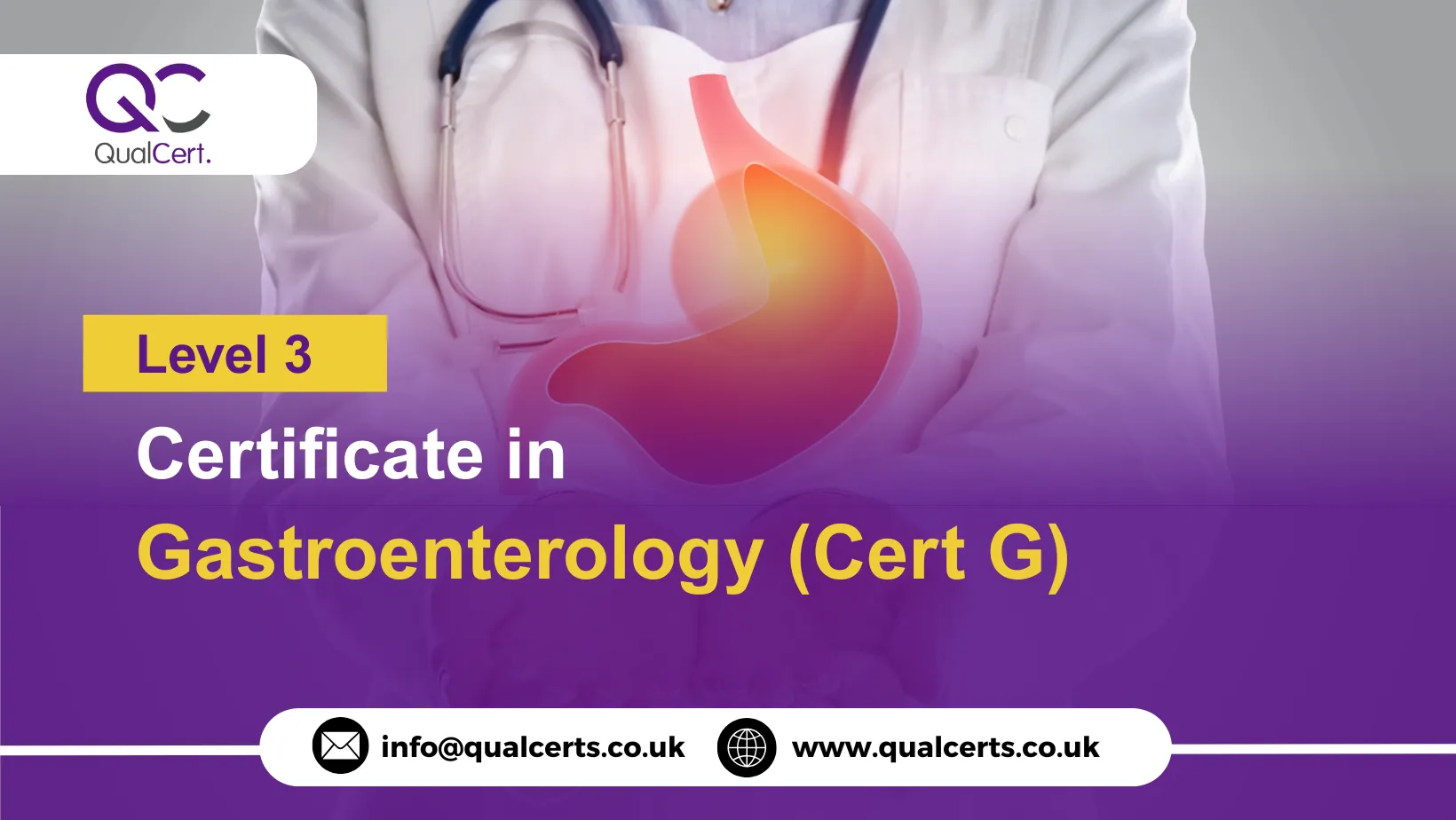The QualCert Level 3 Certificate in Gastroenterology is a specialised qualification designed for healthcare professionals seeking advanced knowledge and practical skills in the diagnosis, management, and care of patients with gastrointestinal conditions. This course provides comprehensive insight into the anatomy and physiology of the digestive system, common gastrointestinal disorders, and contemporary clinical practices in gastroenterology.
The curriculum covers essential topics such as gastrointestinal anatomy and physiology, diagnostic procedures, endoscopic techniques, disease management, nutrition, and patient-centred care. Learners also gain knowledge of evidence-based practices, infection prevention, and clinical guidelines to enhance the quality of care provided to patients. Emphasis is placed on understanding both acute and chronic gastrointestinal conditions, including liver, pancreas, and intestinal disorders, and applying clinical reasoning to improve patient outcomes.
This qualification is ideal for nurses, gastroenterologists, allied health professionals, and healthcare practitioners working in hospitals, outpatient clinics, or specialised gastroenterology departments. It is also suitable for professionals aiming to develop a career in gastroenterology, enhance their clinical expertise, or achieve formal recognition for their skills in managing digestive system disorders.
The QualCert Level 3 Certificate in Gastroenterology adheres to UK professional standards and international best practices, ensuring learners are prepared to deliver safe, effective, and high-quality care. Completing this course enables healthcare professionals to improve patient outcomes, advance their careers, and contribute effectively to multidisciplinary teams within gastroenterology and related healthcare services.
Course Contents of QualCert Level 3 Certificate in Gastroenterology:
The QualCert Level 3 Certificate in Gastroenterology (Cert G) , offers 20 Credits, requiring a Total Qualification Time (TQT) of 100 hours, including 70 Guided Learning Hours (GLH).
| Unit Ref# | Unit Title | Credit | GLH | TQT |
| QC27095-1 | Principles of Gastroenterology | 4 | 14 | 20 |
| QC27095-2 | Anatomy and Physiology of the Digestive System | 4 | 14 | 20 |
| QC27095-3 | Gastrointestinal Disorders and Disease Management | 4 | 14 | 20 |
| QC27095-4 | Diagnostic Procedures and Clinical Interventions | 4 | 14 | 20 |
| QC27095-5 | Professional Practice, Patient Care, and Ethics in Gastroenterology | 4 | 14 | 20 |
Entry Requirements for the QualCert Level 3 Certificate in Gastroenterology (Cert G) :
Minimum Age: 18 years old
Educational Background:
- A minimum of Level 2 qualification in Health, Science, or a related subject
- Or equivalent professional experience in healthcare or clinical support roles
Experience:
- Preferably 6–12 months of experience in healthcare settings, clinical environments, or patient care
- Familiarity with basic medical terminology and procedures is advantageous
Language Proficiency:
- Proficient in English (both written and spoken)
- Ability to understand and interpret medical literature, case studies, and clinical guidelines
Learning Outcomes for the QualCert Level 3 Certificate in Gastroenterology (Cert G) :
Principles of Gastroenterology
- Understand the fundamental concepts and scope of gastroenterology in healthcare
- Recognise common gastrointestinal conditions and their impact on patient health
- Explain the role of evidence-based practice in gastrointestinal care
- Apply principles of safe and effective patient management in gastroenterology
Anatomy and Physiology of the Digestive System
- Describe the anatomy of the digestive tract, including organs and accessory structures
- Explain the physiological processes of digestion, absorption, and excretion
- Understand interactions between the digestive system and other body systems
- Apply anatomical and physiological knowledge to clinical assessments and care planning
Gastrointestinal Disorders and Disease Management
- Identify acute and chronic gastrointestinal diseases, such as liver, pancreas, and intestinal disorders
- Understand risk factors, causes, and progression of gastrointestinal conditions
- Apply evidence-based treatment strategies, including pharmacological and non-pharmacological interventions
- Monitor, evaluate, and adjust care plans to optimise patient outcomes
Diagnostic Procedures and Clinical Interventions
- Understand common diagnostic tools, including imaging, endoscopy, and laboratory investigations
- Conduct clinical assessments and interpret diagnostic results effectively
- Implement clinical interventions following safety and infection control protocols
- Evaluate the effectiveness of interventions and adjust patient management accordingly
Professional Practice, Patient Care, and Ethics in Gastroenterology
- Apply professional standards, ethical principles, and legal requirements in gastroenterology practice
- Provide patient-centred care that respects cultural, social, and individual needs
- Communicate effectively with patients, families, and multidisciplinary teams
- Reflect on clinical practice to enhance professional competence and improve patient outcomes
The QualCert Level 3 Certificate in Gastroenterology (Cert G) is designed for:
- Healthcare professionals seeking to enhance their knowledge of gastroenterology.
- Nurses, clinical support staff, and allied health practitioners working in gastroenterology or related departments.
- Individuals aiming to progress their career in digestive health, hepatology, or internal medicine.
- Students or practitioners looking to gain a recognised professional qualification in gastroenterology.
- Anyone interested in developing practical skills and understanding of gastrointestinal disorders, diagnostics, and patient care.
- Accredited Training Facility: The centre must be an approved QualCert training provider with relevant accreditation.
- Qualified Tutors: Tutors should have recognised qualifications in gastroenterology, healthcare, or related medical fields, with practical experience.
- Learning Resources: Access to up-to-date textbooks, clinical guidelines, journals, and e-learning materials relevant to gastroenterology.
- Practical Facilities: Clinical simulation labs or access to healthcare settings for practical observation and application.
- Assessment Support: Ability to deliver and manage assessments, including written assignments, practical tasks, and case studies.
- Health and Safety Compliance: Centres must adhere to local health and safety regulations and provide a safe learning environment.
- Language Support: Provision for English language support if required to ensure learners can meet course outcomes.

